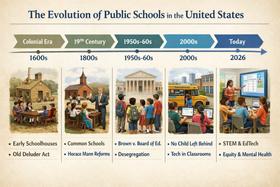Serving 543 students in grades Prekindergarten-5, Kinloch Park Elementary School ranks in the top 50% of all schools in Florida for overall test scores (math proficiency is bottom 50%, and reading proficiency is bottom 50%).
The percentage of students achieving proficiency in math is 44% (which is lower than the Florida state average of 52%). The percentage of students achieving proficiency in reading/language arts is 58% (which is higher than the Florida state average of 52%).
The student-teacher ratio of 16:1 is lower than the Florida state level of 17:1.
Minority enrollment is 99% of the student body (majority Hispanic), which is higher than the Florida state average of 65% (majority Hispanic).
Quick Facts (2026)
- Grades: Prekindergarten-5
- Enrollment: 543 students
- Student-Teacher Ratio: 16:1
- Minority Enrollment: 99%
- Overall Testing Rank: Top 50% in FL
- Math Proficiency: 44% (Btm 50%)
- Reading Proficiency: 58% (Top 50%)
- Science Proficiency: 45-49% (Btm 50%)
- Source: National Center for Education Statistics (NCES), FL Dept. of Education
School Overview
Kinloch Park Elementary School's student population of 543 students has grown by 10% over five school years.
The teacher population of 33 teachers has declined by 10% over five school years.
Grades Offered
Grades Prekindergarten-5
(No virtual instruction)
(No virtual instruction)
Total Students
543 students
Gender %
Total Classroom Teachers
33 teachers
School Calendar
School Rankings
Kinloch Park Elementary School ranks within the top 50% of all 3,662 schools in Florida (based off of combined math and reading proficiency testing data).
The diversity score of Kinloch Park Elementary School is 0.04, which is less than the diversity score at state average of 0.70. The school's diversity has stayed relatively flat over five school years.
Overall Testing Rank
#1721 out of 3662 schools
(Top 50%)
(Top 50%)
Math Test Scores (% Proficient)
44%
52%
Reading/Language Arts Test Scores (% Proficient)
58%
52%
Science Test Scores (% Proficient)
45-49%
52%
Student-Teacher Ratio
16:1
17:1
American Indian
n/a
n/a
Asian
n/a
3%
Hispanic
98%
37%
Black
1%
21%
White
1%
35%
Hawaiian
n/a
n/a
Two or more races
n/a
4%
All Ethnic Groups
Participates in the National School Lunch Program (NSLP)
Yes
Eligible for Free Lunch
61%
47%
Eligible for Reduced Lunch
2%
4%
School Statewide Testing
School District Name
Source: National Center for Education Statistics (NCES), FL Dept. of Education
School Notes
- School Mascot: Scottish Terrier
Frequently Asked Questions
What is Kinloch Park Elementary School's ranking?
Kinloch Park Elementary School is ranked #1721 out of 3,662 schools, which ranks it among the top 50% of public schools in Florida.
What schools are Kinloch Park Elementary School often compared to?
Kinloch Park Elementary Schoolis often viewed alongside schools like Henry M. Flagler Elementary School by visitors of our site.
What percent of students have achieved state testing proficiency in math and reading?
44% of students have achieved math proficiency (compared to the 52% FL state average), while 58% of students have achieved reading proficiency (compared to the 52% FL state average).
How many students attend Kinloch Park Elementary School?
543 students attend Kinloch Park Elementary School.
What is the racial composition of the student body?
98% of Kinloch Park Elementary School students are Hispanic, 1% of students are Black, and 1% of students are White.
What is the student-teacher ratio of Kinloch Park Elementary School?
Kinloch Park Elementary School has a student ration of 16:1, which is lower than the Florida state average of 17:1.
What grades does Kinloch Park Elementary School offer ?
Kinloch Park Elementary School offers enrollment in grades Prekindergarten-5 (No virtual instruction).
What school district is Kinloch Park Elementary School part of?
Kinloch Park Elementary School is part of Miami-Dade School District.
In what neighborhood is Kinloch Park Elementary School located?
Kinloch Park Elementary School is located in the Flagami neighborhood of Miami, FL. There are 5 other public schools located in Flagami.
School Reviews
Review Kinloch Park Elementary School. Reviews should be a few sentences in length. Please include any comments on:
- Quality of academic programs, teachers, and facilities
- Availability of music, art, sports and other extracurricular activities
Recent Articles

Do We Still Need Libraries in Public Schools in 2026
An updated look at the role of public school libraries in 2026, their impact on literacy, equity, and digital learning, and why they remain essential today.

The History of Public Schools in the United States
Explore the history of public schools in the U.S., from colonial roots to 2026 reforms shaping equity, funding, and classroom innovation.

Special-Program Registration Deadlines Explained
Learn what to know about special-program registration deadlines for magnet, CTE, and dual-enrollment options in public schools.





